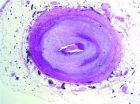(Press-News.org) Researchers have found that a newly developed drug, which is aimed at a particular receptor involved in the development of blood vessels that sustain tumour growth, is active in patients with advanced cancers and, in some cases, has halted the progress of the disease. The drug, ACE-041, targets a different molecular pathway to other anti-angiogenesis drugs and may provide a new option to treat cancer.
Results from a phase I clinical study of ACE-041 were presented at the 22nd EORTC-NCI-AACR [1] Symposium on Molecular Targets and Cancer Therapeutics in Berlin today (Friday). The drug targets a receptor known as activin receptor-like kinase-1 (ALK-1), which regulates the formation of new networks of blood vessels needed for tumour growth – a process known as angiogenesis. While existing anti-angiogenic drugs such as bevacizumab, sunitinib and sorafenib target other angiogenesis receptors such as VEGF, ACE-041 is one of the first to target the ALK-1 pathway.
Professor Sunil Sharma, the Jon and Karen Huntsman Presidential Professor of Cancer Research at the Huntsman Cancer Institute, University of Utah, Salt Lake City (USA), told the meeting that the connection of ALK-1 with angiogenesis was made with the discovery that mutations in the ALK-1 gene caused a condition known as hereditary haemorrhagic telangiectasia 2 (HHT2), which is characterised by impaired formation of capillary beds and causes red markings on the skin.
Acceleron Pharma, a biotechnology company in Cambridge, Massachusetts (USA), designed ACE-041 to inhibit ALK-1 signalling and asked Prof Sharma to be one of the investigators to conduct the first-in-man phase I clinical trial of the drug to see if it would inhibit tumour angiogenesis.
"Since ALK-1 is only transiently expressed on proliferating endothelial cells (the cells that line the inner surface of blood vessels), in contrast to the VEGF receptors which are constitutively expressed on endothelial and other cells, it may be a more selective target for the inhibition of angiogenesis," said Prof Sharma. "ALK-1 expression on tumour vasculature has been noted on tumour biopsy samples from a wide range of tumour types."
The phase I study enrolled patients with a range of advanced solid tumours that had spread to other parts of the body or that were inoperable, such as multiple myeloma, non-small cell lung cancer (NSCLC), head and neck cancers and carcinoid tumours (carcinoma-like neuroendocrine tumours that typically originate in the small intestine or appendix). Most patients had been treated unsuccessfully with a range of other treatments, including anti-VEGF drugs, before joining the trial. They were treated as out-patients and ACE-041 was given via subcutaneous injection.
"As of early September, 25 patients have been enrolled in the study, and we have escalated from the starting ACE-041 dose level of 0.1 mg/kg up to 4.8 mg/kg. One patient with head and neck cancer had a partial response, three patients have had stable disease and several other patients have had strongly positive responses as shown by FDG-PET scans. So far, ACE-041 has been well tolerated, with the most common adverse events being peripheral oedema, fatigue, anaemia, headache and nausea," said Prof Sharma.
"It has been very encouraging to see so many signals of efficacy in this trial, in particular because of the study population. These are end-stage cancer patients, who have already been treated with and become refractory to multiple lines of standard therapy. It has also been encouraging to see signals of ACE-041 activity in a wide range of tumour types, since this aligns with our hypothesis that ACE-041 may have anti-tumour activity in any tumour that has angiogenic activity, regardless of tumour histology. It is also important to note that while we have demonstrated significant activity with ACE-041 monotherapy in this study, we might expect to see even more efficacy in future studies with ACE-041 used in combination with other therapies."
Prof Sharma and his colleagues are planning further investigations of the safety and tolerability of the drug in an additional group of patients and hope to start phase II studies of ACE-041 in 2011.
"The anti-VEGF angiogenesis inhibitors, including bevacizumab, sunitinib and sorafenib, have been an important addition to the armamentarium of anti-cancer therapies," said Prof Sharma. "However, their efficacy is somewhat limited since tumours eventually develop the ability to stimulate angiogenesis with non-VEGF angiogenic factors. They also have serious side-effects that arise from effects on blood vessels in normal tissues. Since ACE-041 inhibits angiogenesis in a completely different way, it may have synergistic efficacy with VEGF-inhibitors, and be effective in patients who have developed resistance to VEGF-inhibitors."
###
Abstract no: 465. Poster on Friday 19 November in the Exhibition Hall (ground level) from 07.00/08.00 hrs to 13.00 hrs CET.
Notes:
[1] EORTC [European Organisation for Research and Treatment of Cancer, NCI [National Cancer Institute], AACR [American Association for Cancer Research].
[2] This study was funded by Acceleron Pharma Inc. For further information on ACE-041 and Acceleron Pharma, visit: www.acceleronpharma.com
UCLA researchers have pinpointed the culprit behind chronic rejection of heart, lung and kidney transplants. Published in the Nov. 23 edition of Science Signaling, their findings suggest new therapeutic approaches for preventing transplant rejection and sabotaging cancer growth.
The team focused on the mechanism behind narrowing of the donor's grafted blood vessels, which blocks blood from reaching the transplanted organ. Starved of oxygen and other nutrients, the organ eventually fails, forcing the patient back on the transplant waiting list.
"Chronic rejection ...
It may have been 1 billion years since plants and animals branched apart on the evolutionary tree but down through the ages they have developed strikingly similar mechanisms for detecting microbial invasions and resisting diseases.
This revelation was arrived at over a period of 15 years by teams of researchers from seemingly disparate fields who have used classical genetic studies to unravel the mysteries of disease resistance in plants and animals, according to a historical overview that will appear in the Nov. 19 issue of the journal Science.
The report, written ...
STANFORD, Calif. — Universal access to lifesaving AIDS drugs — a United Nations' Millennium Development Goal that officials hoped to accomplish by 2010 — would require a staggering $15 billion annual investment from the international community at a time when the economic downturn is challenging continued funding for relief efforts, according to a new analysis by researchers at the Stanford University School of Medicine.
The study underscores the need for groups combating AIDS to rethink how they allocate scarce resources, as what was once the centerpiece of the movement ...
GALVESTON, Texas — In a comprehensive global survey, researchers in Texas and England have concluded that improving the mental and physical health of inmates will improve public health.
In their article, "The health of prisoners," Seena Fazel of the University of Oxford and Jacques Baillargeon of the University of Texas Medical Branch at Galveston, write that caring for the mental and physical health of prisoners has a direct and important impact on public health that should be recognized. Their findings, to be published Online First in the British medical journal The ...
A clearer understanding of the Universe, its origins and maybe even its destiny is a significant step closer, thanks to new research.
As part of a major international experiment called ALPHA*, based at CERN in Switzerland, researchers have helped to achieve trapping and holding atoms of 'anti-hydrogen', which has not previously been possible.
The project involves physicists at Swansea University led by Professor Mike Charlton, Dr Niels Madsen and Dr Dirk Peter van der Werf and the University of Liverpool under Professor Paul Nolan, all supported by the Engineering ...
Like gangsters running a protection racket, drongos in the Kalahari Desert act as lookouts for other birds in order to steal a cut of their food catch. The behaviour, revealed in research funded by the Biotechnology and Biological Sciences Research Council (BBSRC) published in Evolution and reported in Nature's Research Highlights today (18 November), may represent a rare example of two species evolving from a parasitic to a mutualistic relationship.
The team from the Universities of Bristol, Cambridge and Cape Town showed that victimised pied babblers gained a mitigating ...
Different techniques should be used to remove single stones that have become lodged in the distal ureter after being expelled by the kidney, depending on whether they are under or above one centimetre, according to the December issue of BJUI.
Surgeons from the Department of Urology at University Federico II, Naples, Italy, believe that extracorporeal shockwave lithotripsy (ESWL) - which uses a non-invasive acoustic pulse to break down ureteric stones - should be the treatment of first choice in patients with a stone of up to 1cm. Patients with a stone over 1cm should ...
The video games industry is leading the overall trend of transformation of digital products into e-services, according to the report "Born digital/ Grown digital – Assessing the future competitiveness of the EU video games software industry" published today by the European Commission's Joint Research Centre. Online games, for example, play a major role in the digital content convergence process based on digital distribution of different types of content and the diffusion of interactive capabilities for consumers. This phenomenon is having an effect on the movie, video, ...
Scientists and engineers at the internationally acclaimed Space Research Centre at the University of Leicester are developing a conceptual motor design for a Mars 'hopping' vehicle which should lead to a greater understanding of the 'Red Planet'.
Their research findings have been published this month by the Proceedings of the Royal Society A (http://rspa.royalsocietypublishing.org/content/early/2010/11/11/rspa.2010.0438.short?rss=1 )
Robots exploring Mars can carry scientific instruments that measure the physical and chemical characteristics of the Martian surface ...
Researchers funded by the BBSRC Crop Science Initiative have made a discovery that could instigate a paradigm shift in breeding resistance to late blight – a devastating disease of potatoes and tomatoes costing the industry £5-6 billion a year worldwide. They will share this research with industry at an event in London later today (18 November).
Professor Paul Birch of the University of Dundee and his team at the Scottish Crop Research Institute (SCRI), the University of Dundee, and the University of Aberdeen have developed a new approach to breeding resistance to the ...

